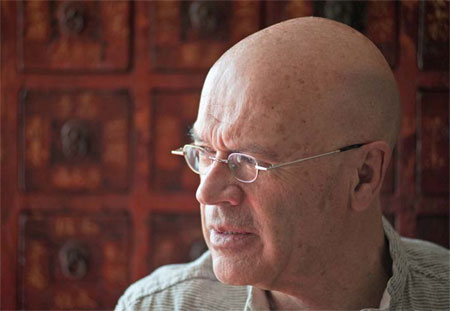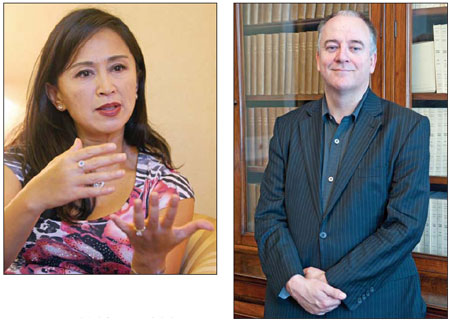Bulging middle
Updated: 2013-02-08 08:50
By Andrew Moody and Lv Chang (China Daily)
|
||||||||
|
Martin Jacques, author of When China Rules the World: The rise of the Middle Kingdom and the End of the Western World. Nick J B Moore / for China Daily |
|
From left: Helen H. Wang, author of The Chinese Dream: The rise of the World's Largest Middle Class and What It Means to You; and Kerry Brown, director of the China Studies Centre at Sydney University. Liu Zhe / China Daily Nick J B Moore / for China Daily |
A recent study by Boston Consulting Group indicates Chinese consumers were prepared to pay a 30 percent higher premium price for iPhones despite their incomes being much lower than that of US consumers.
John Ross, visiting professor at Antai College of Economics and Management of Shanghai Jiao Tong University and a former policy adviser to ex-London mayor Ken Livingstone, says this does not accurately reflect the realities of the market since Apple only has a 7.5 percent share of the China smartphone market.
"Even Samsung, which has been the market leader, is losing share. It is cheaper Chinese brand smartphones such as Lenovo, Coolpad and Huawei which are the big gainers," he says.
|
||||
Ross says there are many difficulties in trying to assess whether people are middle class in China by the consumer choices they make.
"In the US or Europe, McDonald's or KFC, for example, would be considered very cheap and available even to those with very low incomes," he says.
"In China these are relatively higher priced, not bottom of the price range, items. This is why, for example, a KFC restaurant in China has far more 'eat in' tables than a KFC in the US or Europe."
Martin Jacques, author of When China Rules the World: The Rise of the Middle Kingdom and the End of the Western World, believes attempts to define the middle class in China can be hopelessly vague.
"We have got to remember the middle class is a pretty nebulous category. What essentially is the middle class in China and the developing world? Is it really just the new urban classes who have got a bit of money they didn't have before. It is essentially an urban concept."
Kerry Brown, director of the China Studies Centre at Sydney University, has just completed a book, provisionally titled Shanghai 2020, which will have a foreword by the incoming Shanghai mayor Yang Xiong, which examines the middle class in perhaps China's most middle class city.
"In Shanghai you have an authentic middle class because they regard themselves as stakeholders and they are quite demanding in terms of what service they expect from the government," he says.
Brown adds the middle class in China's second largest city can be loosely defined by the fact that they increasingly want greater control over their lives.
"They are also making choices. They don't have one child because of the one-child policy but for economic reasons so they can give that child a good education. They are also making choices about financial products such as life insurance and pensions."
Gerth at Oxford University says the Chinese middle class could be dismissed as just another nouveau riche phenomenon with people buying branded goods just to make statements about who they are.
"It probably is some sort of nouveau riche phenomenon but it is more of an intensified example of something familiar to us. It is not that it somehow hasn't happened anywhere else. Chinese people aren't Martians," he says.
Atsmon at McKinsey & Co says the significant difference between the new Chinese middle class and that of the US and Europe is they are entering this strata of society in a different era.
When Westerners became middle class, he argues, there were far few choices available.
"As consumers there are far more choices to make and being middle class is a much more complex thing than it was 80 to 100 years ago," he says.
Contact the writers at andrewmoody@chinadaily.com.cn and lvchang@chinadaily.com.cn
(China Daily 02/08/2013 page1)

 Li Na on Time cover, makes influential 100 list
Li Na on Time cover, makes influential 100 list
 FBI releases photos of 2 Boston bombings suspects
FBI releases photos of 2 Boston bombings suspects
 World's wackiest hairstyles
World's wackiest hairstyles
 Sandstorms strike Northwest China
Sandstorms strike Northwest China
 Never-seen photos of Madonna on display
Never-seen photos of Madonna on display
 H7N9 outbreak linked to waterfowl migration
H7N9 outbreak linked to waterfowl migration
 Dozens feared dead in Texas plant blast
Dozens feared dead in Texas plant blast
 Venezuelan court rules out manual votes counting
Venezuelan court rules out manual votes counting
Most Viewed
Editor's Picks

|

|

|

|

|

|
Today's Top News
Boston bombing suspect reported cornered on boat
7.0-magnitude quake hits Sichuan
Cross-talk artist helps to spread the word
'Green' awareness levels drop in Beijing
Palace Museum spruces up
First couple on Time's list of most influential
H7N9 flu transmission studied
Trading channels 'need to broaden'
US Weekly

|

|





















